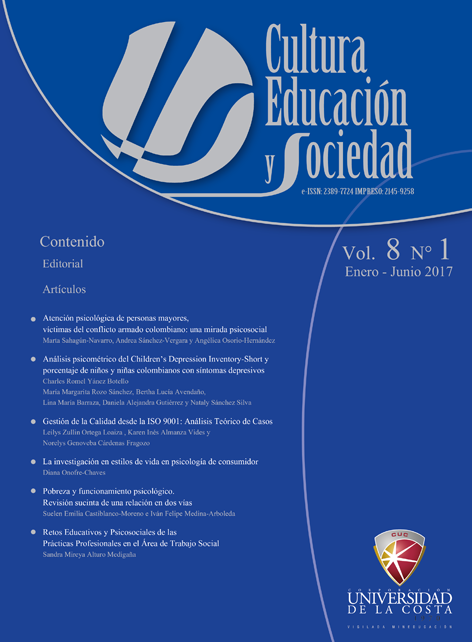Educational and psychosocial challenges of professional practices in the social work area
DOI:
https://doi.org/10.17981/cultedusoc.8.1.2017.06Keywords:
Professional practice; education; psychosocial intervention; social workAbstract
This article establishes a reflection on the educational and psychosocial challenges facing the students and teachers who guide the professional practices in the area of social work. For this purpose, an evalua-tive documentary research derived from the socio-critical analysis was carried out, based on a sample of activities, reports and practice reports in the Basic and Media Education Institutions where the students assigned to the Social Work Program of the Universidad de La Guajira during the years (2015-2016). Among the main findings, it has been identified that professional practice scenarios represent a broad field of different educational problems and psychosocial intervention applied in the contexts related to school, family and community level. Among the main problems have been identified the problems of school conflict and violence, communication and development of socio-educational skills, as well as the incidence of problems of family integration, violence and intrafamily abuse, together with the needs of integration and community social development.
Downloads
References
Amar, J., & Abello, R., & Martínez, M., & Monroy, E., & Cortés, O., & Crespo, F. (2011). Creencias sobre la naturaleza de la pobreza en un grupo de niños de nivel socioeconómico alto y bajo de la ciudad de Barranquilla (Colombia). Psicología desde el Caribe, 27, 136-159.
Amar, J., & Abello, R., & Martínez, M., & Monroy, E., & Cortés, O., & Crespo, F. (2011). Categorización social y cogniciones infantiles sobre la pobreza en niños: Una mirada desde el esencialismo psicológico. Investigación & Desarrollo, 19 (1), 116-139.
Antequera-Manotas, E., & Cortés-Peña, O. (2016). Problems, challenges, trends and prospects for special education for talented children. The European Proceedings of Social & Behavioural Sciences–EpSBS, 16(1), 857-861.
Avendaño-Villa, I., Cortés-Peña, O. F., & Guerrero-Cuentas, H. (2015). Competencias sociales y tecnologías de la información y la comunicación como factores asociados al desempeño en estudiantes de básica primaria con experiencia de desplazamiento forzado. Diversitas, 11(1), 13-36.
Castillo Riquelme, V., & Rodríguez Garcés, C. (2016). Los problemas del stock en campos profesionales difusos: Oferta educativa en Trabajo Social. Estudios Pedagógicos, XLII (1), 37-52.
Curbelo-Hernández, E., & Del-Sol-Florez, H. (2010). Trabajo social y mediación familiar: un enfoque para la protección del menor en el proceso mediador. Orientaciones para la práctica profesional en los supuestos de ruptura de pareja. Portularia, X (2), 33-49.
Falla Ramírez, U., & Gómez Contreras, S., & Rodríguez, R. (2013). Fenomenología de motivos en la resolución de dilemas que enfrentan los trabajadores sociales en su práctica profesional. Tabula Rasa, 18, 289-299.
Fallas Jiménez, Y. (2009). Trabajo social, formación profesional y categoría trabajo. Reflexiones, 88 (1), 67-76.
Gómez-Gómez, F. (2010). Competencias profesionales en trabajo social. Portularia, X (2), 51-63.
Guerra, Y. (2003). Instrumentalidad del proceso de trabajo y Servicio Social. Revista Servicio Social & Sociedad, 62, 5-15.
Iturrieta Olivares, S. (2012). Desafíos del Trabajo Social en un campo laboral con límites profesionales difusos. Revista Katálysis, 15(2), 163-172.
Mallardi, M., & Cañizares, B. (2011). La aprehensión de la cuestión social en la práctica del Trabajo Social: Aportes para la elaboración de proyectos sociales en el ejercicio profesional. Portularia, XI (2), 15-21.
Martino Bermúdez, M., & Bentura, C., & Melgar, A. (2006). Tendencias actuales en el Trabajo Social uruguayo: hacia un campo profesional envejecido?. Revista Katálysis, 9 (2), 237-248.
Palomar Villena, M., & Suárez Soto, E. (1993). El modelo sistémico en el trabajo social familiar: consideraciones teóricas y orientaciones prácticas. Alternativas. Cuadernos de Trabajo Social, 2,169-184.
Peña, O. F. C., Santos, A. R. P., & Atrio, S. I. (2015). E-portafolio como herramienta construccionista del aprendizaje activo en tecnología educativa. Revista Lasallista de Investigación, 12(2).
Pinto Santos, A., & Cortés Peña, O., & Alfaro Camargo, C. (2017). Hacia la transformación de la práctica docente: modelo espiral de competencias TICTACTEP. Pixel-Bit. Revista de Medios y Educación, 51, 37-51.
Ponce-de-León-Romero, L. (2012). Teorizar la experiencia profesional del trabajo social. Portularia, XII, 141-147.
Rama, C. (2009). La tendencia a la masificación de la cobertura de la educación superior en América Latina. Revista Iberoamericana de Educación, 50, 173-195.
Ronda Ortín, L. (2012). El educador social. Ética y práctica profesional. Pedagogía Social. Revista Interuniversitaria, 19, 51-63.
Downloads
Published
How to Cite
Issue
Section
License
Copyright (c) 2017 CULTURA EDUCACIÓN Y SOCIEDAD

This work is licensed under a Creative Commons Attribution-NonCommercial-NoDerivatives 4.0 International License.
![]()
Creative Commons 2020 CULTURA EDUCACIÓN Y SOCIEDAD
This article is under international license Creative Commons Reconocimiento-NoComercial-SinObrasDerivadas 4.0.
The published articles are the sole responsibility of their authors and do not necessarily reflect the opinions of the editorial committee.
CULTURA EDUCACIÓN Y SOCIEDAD respects the moral rights of its authors, who assign to the editorial committee the patrimonial rights of the published material. In turn, the authors inform that this work is unpublished and has not been previously published.
All articles are under a:
Licencia Creative Commons Atribución-NoComercial-SinDerivadas 4.0 Internacional.
![]()


 English
English
 Español (España)
Español (España)




_12.53_.27_p_. m_._3.png)





_12.57_.35_p_. m_._3.png)
_12.50_.37_p_. m_._3.png)



